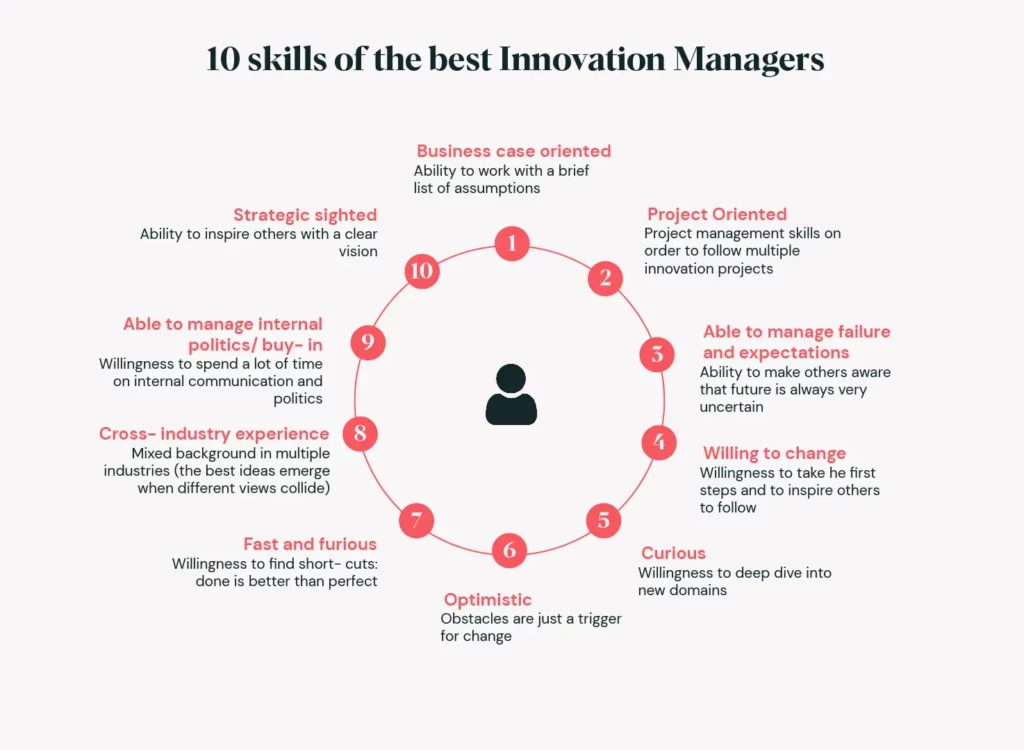Definition & job description
First of all, who is an innovation manager? By comparing multiple vacancies, job titles, and buzzwords, we’ve come up with the following overall definition:
The innovation manager is the person that leads the research into strategic future business opportunities for a company.
More specifically, she/he has to blend 3 main mindsets, HR-, tech- and business-related. In particular, she/he is in charge of:
- Allocating resources and setting up teams, shaping a long-term capability.
- Managing the process and monitoring the progress of the various ongoing initiatives;
- Building out innovation capabilities and transferring them into the corporate culture to impact the broader organization.
Often confused with the innovation manager is the head of R&D. Although instrumental to innovation, this division often takes a purely technological approach. Therefore it will only serve as part of the puzzle. An innovation manager will have to complement the technological advancements with capabilities to build products that people want and business cases that corporates can support.
Job title options
In big organizations, the most frequent job titles for innovation managers would be head of innovation, innovation director or chief innovation officer.
In medium and smaller enterprises, and in startups, you may more frequently find the word “Innovation” attached to other job titles, such as innovation product manager, innovation project manager or new business developer.
10 top skills of the best innovation managers

By definition, an innovation role covers many different areas of expertise. We’ve listed the most prominent skills you might be looking for on the resume of job candidates. A T-shaped profile will probably be the one you’re looking for. You need an emphatic generalist that can quickly jump from one domain to the other.
For each, we’ve added a couple of example questions. Use this list to write your own interview script. We also hire innovation consultants for our own team.
1. Business case oriented
Working with limited info should not be a problem. An innovation manager should be able to work with a brief list of assumptions to build the basic of an innovative business case.
- What could be the selling price of Virtual Reality Goggles for surgeons?
- What would need the biggest investment: Building & maintaining a support chatbot or hire an extra support colleague?
2. Project oriented
Many innovation managers have to follow up on dozens of innovation projects. Make sure to look for people with a decent level of project mgmt experience. This person will have to manage your innovation process. You don’t want a creative dreamer at the wheel, right?
- Which project management tools or services have you used before. Why (or why not) were those tools the best solution for the task at hand?
- What is the most difficult part of managing a new business or innovation project?
3. Manage failures and exceptions
The more disruptive the project, the bigger the chance failure can occur. You’re walking in new territory, so an innovation manager will need to prepare others around her that future is always very uncertain.
- What is the biggest threat to an innovation project? How to manage this risk?
- How many client/users would you talk to before going public with a new innovation?
4. Willing to change
Talking about change is not enough. Look for candidates that are willing to take the first steps themselves. By doing so, they can inspire others to follow.
- When and how did you initiate a new idea that was out of the comfort zone for most people?
- Name a situation where you managed to change how your organization worked?
5. Curious
Look for people that are eager to find new information. People that want to deep dive into new domains.
- Tell me something most people don’t know about?
- Do you follow niche websites, people or sources about a very specific topic?
6. Optimistic
Innovation leads will need to see opportunities everywhere. Obstacles are just a trigger for change.
- Name a failed innovation but that you could relaunch in the market? Explain how.
- When would you stop an innovation program or project?
7. Fast and furious
Thinkers that take 2 years develop an idea are probably not the leaders to steer an innovation team. You need people that will look for shortcuts. People that understand that done is better than perfect.
- Have you ever launched a project that you’re ashamed of today? Why?
- What was the fastest cycle you ever experience to go from the first idea to public launch? What was your role in this initiative?
8. Cross-industry experience
Ideally, an innovation manager has a mixed background with practical experience in multiple industries. The best ideas emerge when different views collide.
- When did you solve a problem in your organization, based on info you learned elsewhere?
- How do you keep yourself up to date, what sources do you follow? (generalist will mention a mix of domains)
9. Able to manage internal politics / buy-in
A corporate is packed with internal politics. Innovation projects are the perfect fuel to spark internal fires. An innovation manager will need to spend a lot of time on internal communication.
- Explain a situation where an important project got blocked in the ‘red tape’ of your organization. What did you do to move this project forward?
- When working on a new innovation project, who needs to stay in the loop? (other roles/departments/…) Who needs to stay out?
10. Strategic sighted
Innovation project fall by definition out of your companies comfort zone. Can this person inspire others with a clear vision where else the company needs to look?
- Can you give an example of a promising technology that most people see as the next big thing, but that you don’t agree with?
- Which small or medium-sized company has a strong innovation strategy & why? (avoid that people just talk about Apple, Facebook, Google or Amazon)
Pitfalls
Creativity is not essential
This could sound like a contradiction to some, but an innovation manager should not be expected to be the most creative person out there. You need a decent project manager with interest in innovation, someone that can keep structure, etc. This person will need to manage other creatives that can generate new ideas and solutions. But don’t put creative wizard at the steering wheel. Things might get messy 🙂
Strategic focus over interest
Because this person is expected to follow numerous of domains and industries, there is a definite pitfall that he or she can be too easily distracted by new things. Being self-aware about this pitfall is the first step. Make clear decisions about the strategic focus and check if new information comes in between, just because it’s new.
Broad view of sector expertise
While a full helicopter view has significant benefits, sometimes you need to dig deep on just one topic. Look for people that can connect with experts when needed. A decent networker will be very beneficial for your organization.


